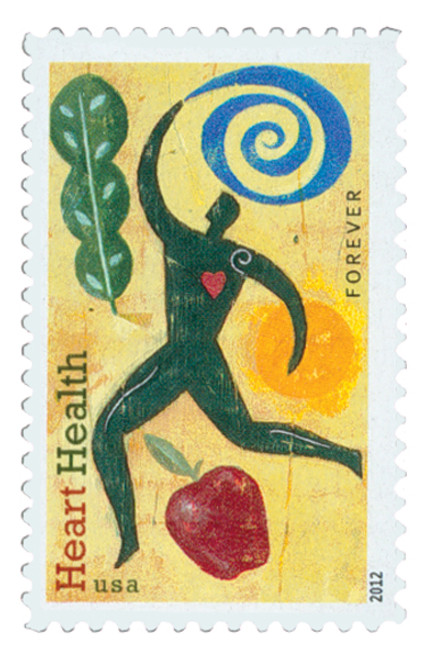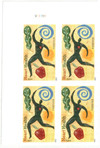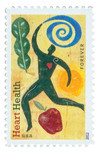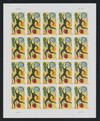
# 4625 - 2012 First-Class Forever Stamp - Heart Health
U.S. #4625
2012 45¢ Heart Health
Issue Date: February 9, 2012
City: Washington, DC
Quantity: 50,000,000
Printed By: Avery Dennison
Printing Method: Photogravure
Color: Multicolored
Laughter really is good medicine. Blood flow increases for up to 45 minutes after a hardy chuckle, so watching a comedy is a fun way to improve heart health. Making small, simple lifestyle changes like this can reduce the risk of coronary heart disease, the leading cause of death in American adults.
Physical activity strengthens the heart and cardiovascular system plus helps maintain a healthy weight. Walking is a form of exercise that is easy to do. Taking a walk through a park is a pleasant way to reduce stress while burning calories. Every hour of walking has been shown to increase life expectancy by two hours.
People who enjoy their exercise are more likely to stick with it. Some choose gardening or ballroom dancing, while others take a bike ride. Each activity leads to a healthier heart.
Eating a well-balanced diet can increase heart health by lowering cholesterol. Farmers’ markets offer fresh, locally grown produce that adds taste, color, and nutrition to a menu.
Planning for exercise and healthy eating is essential to success in fighting heart disease. Raising awareness of this disease and its prevention can lead to healthier hearts and longer lives.
Dr. Paul Dudley White
White developed an interest in medicine at an early age, when he accompanied his father, a family doctor, on house calls in his horse and buggy. Dudley went on to attend the Roxbury Latin School and Harvard College, before earning his M.D. from Harvard Medical School in 1911.
During this time, White interned at Massachusetts General Hospital and co-authored his first paper with Dr. Roger I. Lee on blood coagulation. Their work remains the standard used today to measure the speed of blood coagulation. Then in 1913, White was invited by Harvard to go on a traveling fellowship to London to study cardiovascular physiology with Thomas Lewis. The experience was extremely formative for White, who would then become one of America’s leading cardiologists.

During World War I, White served as a medical officer first with the British Expeditionary Force and later with the American Expeditionary Force. After the war he returned to Massachusetts General Hospital. After a year as a resident, he became Chief of the Medical Out-Patient Department in 1920. White was made a clinical instructor at Harvard in 1921, rising through the ranks to emeritus professor before retiring from teaching in 1956.

In addition to being recognized as an excellent teacher, White wrote 12 books and more than 700 scientific articles. His most well known work was his textbook, Heart Disease, which was published in 1931. He also worked with Doctors Louis Wolff and John Parkinson to identify the Wolff-Parkinson-White syndrome, a form of uncontrolled rapid heartbeat.

White is often considered the to be the founder of preventive cardiology. He helped to found the American Heart Association in 1924 and was made its president in 1941. He also helped create the International Association of Cardiology and the International Cardiology Foundation. Additionally, White was the executive director of the National Advisory Heart Council, the head consultant to the National Heart Institute, and helped establish the National Institutes of Health. White was also influential in international cardiology organizations, helping to found the International Society of Cardiology.

After President Dwight Eisenhower’s 1955 heart attack, he chose White as his personal physician. In this position, the doctor was able to advocate healthy eating and exercise as ways to prevent heart disease. He specifically recommended cycling for the president, which gave the bicycle industry a significant boost.
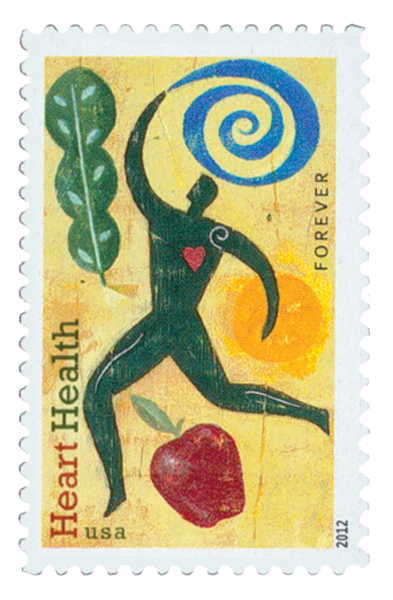
Dr. White received a number of honors and awards during his career. These included the NYU University Medal, the American Medical Association’s distinguished service award, the Lasker award, and the Presidential Medal of Freedom. He spent his later years traveling the country speaking about heart disease and his hope for world peace. Dr. White died following a stroke on October 31, 1973. Years later, a section of the Charles River Bike Path in Boston was named in his honor.
U.S. #4625
2012 45¢ Heart Health
Issue Date: February 9, 2012
City: Washington, DC
Quantity: 50,000,000
Printed By: Avery Dennison
Printing Method: Photogravure
Color: Multicolored
Laughter really is good medicine. Blood flow increases for up to 45 minutes after a hardy chuckle, so watching a comedy is a fun way to improve heart health. Making small, simple lifestyle changes like this can reduce the risk of coronary heart disease, the leading cause of death in American adults.
Physical activity strengthens the heart and cardiovascular system plus helps maintain a healthy weight. Walking is a form of exercise that is easy to do. Taking a walk through a park is a pleasant way to reduce stress while burning calories. Every hour of walking has been shown to increase life expectancy by two hours.
People who enjoy their exercise are more likely to stick with it. Some choose gardening or ballroom dancing, while others take a bike ride. Each activity leads to a healthier heart.
Eating a well-balanced diet can increase heart health by lowering cholesterol. Farmers’ markets offer fresh, locally grown produce that adds taste, color, and nutrition to a menu.
Planning for exercise and healthy eating is essential to success in fighting heart disease. Raising awareness of this disease and its prevention can lead to healthier hearts and longer lives.
Dr. Paul Dudley White
White developed an interest in medicine at an early age, when he accompanied his father, a family doctor, on house calls in his horse and buggy. Dudley went on to attend the Roxbury Latin School and Harvard College, before earning his M.D. from Harvard Medical School in 1911.
During this time, White interned at Massachusetts General Hospital and co-authored his first paper with Dr. Roger I. Lee on blood coagulation. Their work remains the standard used today to measure the speed of blood coagulation. Then in 1913, White was invited by Harvard to go on a traveling fellowship to London to study cardiovascular physiology with Thomas Lewis. The experience was extremely formative for White, who would then become one of America’s leading cardiologists.

During World War I, White served as a medical officer first with the British Expeditionary Force and later with the American Expeditionary Force. After the war he returned to Massachusetts General Hospital. After a year as a resident, he became Chief of the Medical Out-Patient Department in 1920. White was made a clinical instructor at Harvard in 1921, rising through the ranks to emeritus professor before retiring from teaching in 1956.

In addition to being recognized as an excellent teacher, White wrote 12 books and more than 700 scientific articles. His most well known work was his textbook, Heart Disease, which was published in 1931. He also worked with Doctors Louis Wolff and John Parkinson to identify the Wolff-Parkinson-White syndrome, a form of uncontrolled rapid heartbeat.

White is often considered the to be the founder of preventive cardiology. He helped to found the American Heart Association in 1924 and was made its president in 1941. He also helped create the International Association of Cardiology and the International Cardiology Foundation. Additionally, White was the executive director of the National Advisory Heart Council, the head consultant to the National Heart Institute, and helped establish the National Institutes of Health. White was also influential in international cardiology organizations, helping to found the International Society of Cardiology.

After President Dwight Eisenhower’s 1955 heart attack, he chose White as his personal physician. In this position, the doctor was able to advocate healthy eating and exercise as ways to prevent heart disease. He specifically recommended cycling for the president, which gave the bicycle industry a significant boost.

Dr. White received a number of honors and awards during his career. These included the NYU University Medal, the American Medical Association’s distinguished service award, the Lasker award, and the Presidential Medal of Freedom. He spent his later years traveling the country speaking about heart disease and his hope for world peace. Dr. White died following a stroke on October 31, 1973. Years later, a section of the Charles River Bike Path in Boston was named in his honor.

